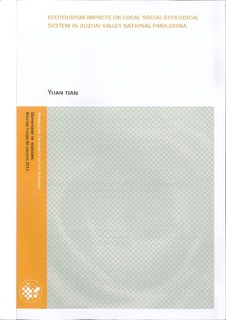| dc.description.abstract | Ecotourism, which is widely and rapidly developed all over the world, is nowadays regarded as an alternative to mass tourism. Jiuzhai Valley National Park is the native place for more than 1,000 Tibetan people, and has a long history of ecotourism development in China. Although it has been considered as a successful case, there was no status report of ecotourism impacts on local social-ecological system. This study investigated how the ecosystems were protected and affected by ecotourism development in this area, especially the impacts on biodiversity conservation and the freshwater aquatic ecosystem. The research also sought to present an impact assessment on the local community, including life style, religion, and degree of community participation. Qualitative methods were adopted as the main research approach, and quantitative method of questionnaire was used as assistance.
After ecotourism developed in the park, projects of reforestation and landslides control were observed to be helpful to minimize impacts caused by natural disasters on the ecosystem. However, the large number of tourists and lack of monitoring program have also caused negative impacts on biodiversity conservation and freshwater aquatic ecosystem, despite Jiuzhaigou Administrative Bureau (JAB) taking many other conservation measures. To indigenous Tibetan people, ecotourism development is a double-edged sword which has influenced their life profoundly. On the one hand, income growth and modernization of life style have improved the quality of local residents’ life considerably, and Tibetan people are able to spend more money on participating in religious activities to strengthen their beliefs. On the other hand, cultural assimilation has occurred spontaneously, and loss of traditions in local community has become more and more obvious. Scarce local educational infrastructure is also a critical problem which has restricted young people’s self-development. According to ecotourism principles, this study also explored the degree of indigenous people’s participation in ecotourism, and the findings indicate that the degree of community participation in the park was still at primary level. Apart from sharing economic benefits through subsidies and employment, conservation of indigenous culture and knowledge, promoting social harmony and political involvement need to be strengthened. Community participation cannot be accomplished unless indigenous residents are involved in decision-making process. By assessing ecotourism impacts on ecological and social systems inside the park, the study applied resilience theories to provide further understanding that building resilience is the key factor for achieving sustainability of the local social-ecological system and ecotourism. | no_NO |
